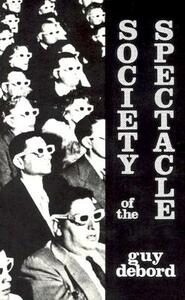You need to sign in or sign up before continuing.
Take a photo of a barcode or cover
reflective
fast-paced
challenging
informative
I think the major thing is to understand what the term “Spectacle” is for Debord, and through that we can then tackle it from all possible directions and assessing it. I spent a significant amount of time being convinced of one definition and then a couple pages later being convinced of another. The major task for me was defining what the Spectacle actually is, and how it persists within a capitalist society.
What Debord says of today is a reality that is of having; human value is determined by what they own or have and not by their being or essence. An emphasis on understanding this “masked reality” of ours that drives alienation among the people or society in its entirety, and that their only way of coming together is through their ability to contribute to the economy whether as a commodity or through consumption culture.
I think it was deliberate for Debord to not render The Spectacle a fixed definition, in other words to not limit it. We must not think of The Spectacle as letter A but rather as the entire Alphabet, and examine its implementations in each letter.
I’ve yet to dig deep into Marxism and I believe that having done so would’ve at least made this a smoother ride, considering Debord is a Marxist theorist, and also understanding whether or not there exists a distinction between Karl Marx’s Commodity Fetishism and Debord’s Spectacle.
Because another view that I’ve gathered from The Spectacle is this: The media that we consume is not the only thing that can be categorised as The Spectacle, but we must also consider the chain that transfers this so called media or “images” — the mechanism of transmission itself is also the spectacle, and us too as the consumers, can be a part of it, becoming the oil that keeps the engine running.
TikTok would be a prime example of a contemporary spectacle that is very much active.
- The algorithm renders an illusion of control and choice — that what appears on a person’s feed is of their preference, taste or self. But in actuality it (the algorithm) is shaped by what TikTok wants to have them engaged with — what’s profitable, viral, addictive, etc.
- Truth can also be shaped. With short videos, a lack of context, misinformation, soundtracks or sounds, and a frame of aesthetics, the perception of events, people, and even politics can become distorted.
- Users also become The Spectacle as an end result by turning to content creation, thus shaping their identity, visibility, and approval. Thus you end up seeing them acting in ways that are not of their person but what their followers or consumers of The Spectacle would want them to, like speaking on the on-going genocide in Palestine or Congo and showing their solidarity. But things like their major brands can be a hindrance to their show of stance which brings up back to a suppression of identity. (Debord speaks of something similar on theses 60-61)
But like with all my views this too is open to change, and a different perspective could emerge in the future, or better yet a possible expansion with respect to not solely limiting it to TikTok, and that it can obviously be applied elsewhere.
Chapter 4: The Proletariat as Subject and Representation, is the most crucial part of the book because Debord shifts our focus from mass media or “images” and provides narrative to the history of socialism, how we can properly relearn socialism, and reignite the revolution that defines modern life.
He goes on to say that proletarian revolutions are dependent on the condition that theory must be recognised and lived through the masses, rather than remaining an abstract concept or idea. To act as we think. Workers must become dialecticians and place their thoughts into practice.
He also explained the structure on fascism, capitalism, and bureaucracy as to how they can either influence or repress a proletarian revolution.
The Society Of The Spectacle is undoubtedly dense, but its importance and value makes every page worth it. Debord’s writing style reminds me a lot of Cioran and his aphorisms, but Debord (although quite complex) is more grounded rather than being absurdly abstract and his theses are lengthy —rendering a sufficient amount of context on whatever he’s discussing.
The times that we’re living in today make ideas such as these very much essential, and so I believe that from time to time I will be revisiting this work and going over all the theses that I highlighted.
“The world already dreams of such a time. In order to actually live it, it only needs to become fully conscious of it.”
informative
medium-paced
man predicts everything happening in todays society 50+ years prior
challenging
informative
reflective
medium-paced
reflective
There is a major ‘did this man have a time machine??’ element to this 1967 work of French philosophy. Because when he argues that late stage capitalism is turning us into the society of the spectacle, aka “a social relation among people, mediated by images”
Umm, yeah. Can confirm.
He doesn’t just predict things like instagram. He predicts a lot of the very specific features of instagram that we’re struggling to put words to, like:
▪️ the shift from consumption to the appearance of consumption
▪️ how instagram doesn’t just connect consumers to products but *creates* consumers for products
▪️ even the interaction between totalitarianism and social media, aka social media as “the ruling order’s nonstop discourse about itself; its never-ending monologue of self-praise, its self-portrait at the stage of totalitarian domination of all aspects of life.”
So why the three stars? Put very simply: Debord neglects his Hegel. He posits a dualism between “the real” and “the image” (Hegel has specific critiques for all types of ontological dualisms, including this one). And if a philosopher tries to posit a dualism, straight to the trash 🗑️
Especially if said philosopher tries to critique Hegel as “teleological”—a misreading I’m tired of.
Umm, yeah. Can confirm.
He doesn’t just predict things like instagram. He predicts a lot of the very specific features of instagram that we’re struggling to put words to, like:
▪️ the shift from consumption to the appearance of consumption
▪️ how instagram doesn’t just connect consumers to products but *creates* consumers for products
▪️ even the interaction between totalitarianism and social media, aka social media as “the ruling order’s nonstop discourse about itself; its never-ending monologue of self-praise, its self-portrait at the stage of totalitarian domination of all aspects of life.”
So why the three stars? Put very simply: Debord neglects his Hegel. He posits a dualism between “the real” and “the image” (Hegel has specific critiques for all types of ontological dualisms, including this one). And if a philosopher tries to posit a dualism, straight to the trash 🗑️
Especially if said philosopher tries to critique Hegel as “teleological”—a misreading I’m tired of.
informative
reflective
medium-paced
It’s unsettlingly how relevant this is in the peak age of social media.
challenging
reflective
medium-paced
challenging
medium-paced
just read chapter 1 of kapital instead and then check out some barthes
A brief examination of consumerism, alienation, and class confict through a Marxist lens. Debord's comments about how people can isolate themselves when consuming and/or being entertained made me reexamine social media and other means of communication that hole people up even when intending to experience with others.








